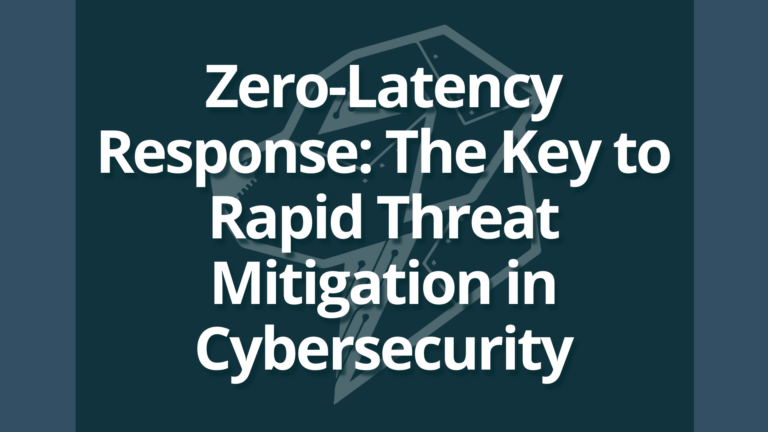Organizations, both large and small, face a constant threat. Sophisticated attacks can compromise their data and disrupt operations. Businesses of all sizes face a major challenge. To combat the ever-present danger, many are turning to Managed Detection and Response (MDR) service providers.
These providers offer expert assistance and robust security solutions. Many businesses are turning to Managed Detection and Response (MDR) service providers to fight the ongoing threat. They offer expert assistance and strong security solutions.
With numerous MDR providers saturating the market, finding the right partner can be a daunting task. It is important to find a provider that understands the unique security challenges of your organization. Additionally, they need to have the features and capabilities to effectively protect your digital assets.
What are these key considerations that can significantly impact the effectiveness of an MDR provider?
We will explore the features and capabilities that separate a truly reliable and efficient provider from the rest. Understand the crucial elements. This will help you make an informed decision.
The Importance of Choosing the Right MDR Provider
It is essential to select the right Managed Detection and Response (MDR) provider for your organization. This will ensure your security posture, incident response capabilities, and the protection of your data and assets. The effectiveness of these crucial aspects heavily depends on the expertise and capabilities of your MDR partner.
Making a well-informed decision in choosing an MDR partner is essential for maintaining a strong defense against evolving cyber threats.
Here are some key reasons why choosing the right MDR provider is of utmost importance:
- Enhanced Threat Detection and Response: A reliable MDR provider equips your organization with advanced threat detection technologies and expertise. They have specialized tools and knowledge. This helps them spot potential threats quickly. This reduces the risk of successful attacks.
- Proactive Security Monitoring: An effective MDR provider offers continuous monitoring of your IT infrastructure and network. They monitor for potential vulnerabilities, unusual activities, and suspicious behaviors. They take proactive steps to identify and address security risks before they worsen. This proactive approach ensures that potential threats are dealt with swiftly, minimizing potential damage or data breaches.
- Rapid Incident Response: The right MDR provider should have robust incident response capabilities in place. Protocols should be clearly defined. Experienced incident responders should be employed. A coordinated approach should be taken to minimize the impact of the incident, reduce downtime, and prevent further breaches.
- Expertise and Knowledge: MDRs have extensive knowledge and experience in tackling different cyber threats, hiring experienced security analysts and professionals. This knowledge includes the latest information on emerging threats, attack methods, and industry-recommended practices. This knowledge ensures that your security strategies remain current and effective.
- Scalability and Flexibility: As your organization grows, your security needs will change too. The right MDR provider can adapt and grow with you. They should be able to handle more data, accommodate a larger network, and adjust their strategies to match your changing goals.
- Cost Efficiency: The right MDR provider helps to prevent successful attacks. This minimizes downtime and reduces the impact of security incidents. This in turn mitigates potential financial losses and reputational damage.
How to Choose the Right MDR Provider
Identifying your organization’s security needs: Think about what kind of security the organization needs. Consider things like how secure systems are, the risks that are faced, and any special rules that need to be followed. This will help organizations figure out what services are required from an MDR provider.
Evaluating potential providers based on key features: What are the features that the MDR providers have in their wheelhouse?
Some examples are:
- Monitoring and Detection
- Incident Response
- Endpoint Protection
- Compatibility
- Keeping up with Threats
Putting It All Together
Selecting the appropriate MDR provider is important in ensuring the safety of your organization against cyber threats.
However, making this decision can be challenging. To make an informed choice, it is essential to evaluate key features and ask the right questions during the selection process.
Failure to choose the right MDR partner can result in severe consequences for organizations. Security breaches can lead to data breaches, financial loss, and significant damage to a company’s reputation.
Inadequate security measures can delay the organization’s ability to detect and respond to threats promptly, which increases the risk of further harm.
When searching for an MDR provider, it is important to consider their proven track record of success, availability, and quick response times. Look for providers that possess advanced threat detection capabilities and comply with industry standards. Customizable service options are beneficial as each organization has unique security needs that require tailored solutions.
To ensure a successful partnership, remember to:
- Identify your organization’s specific security needs: Determine the specific security requirements and challenges faced by your organization to find an MDR provider that can effectively address them.
- Evaluate potential providers based on key features: Compare and assess the features, capabilities, and expertise of different MDR providers to determine which ones align best with your organization’s requirements.
- Ask the right questions: Inquire about the provider’s experience, methodologies, and technologies they employ to ensure they can meet your organization’s security goals. Additionally, ask about their incident response procedures and how they handle emerging threats.
By following these steps and considering these factors, an informed decision can be made when choosing an MDR provider, ultimately strengthening the organization’s security posture and safeguarding against potential cyber threats.



